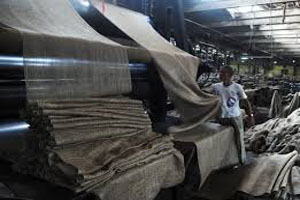
West Bengal jute mills cut output by 30 to 40pc over drop in order flow
YarnsandFibers News Bureau 2014-10-27 14:15:00 – New DelhiJute demand has been on a down slide forcing many jute mills in West Bengal to down their shutters or go for reduced shifts. There has been a production cut of 30 to 40 percent in the last few months because of drop in order flow.
According to industry officials, jute mills in West Bengal are running at 60 per cent of their capacity and about one lakh workers have been rendered jobless. West Bengal has 64 of the 84 jute mills in the country.
Industry leaders attribute the slowdown to the Punjab government’s decision to buy fewer sacks during the ongoing kharif season May-October. West Bengal chief secretary Sanjay Mitra wrote to Union textile secretary Sanjay Kumar Panda last week, explaining the situation and urging him to take up the issue with the Punjab government.
Panda suggested that one solution could be to develop demand for jute goods within the state in order to prevent closure of mills and large-scale unemployment.
The Union textile ministry has also raised the issue of illegal import of jute goods and urged the West Bengal government to support the jute commissioner administratively to prevent illegal import of jute products from Bangladesh and Nepal.
Other suggestions from the ministry included exploring the use of jute bags to pack potatoes and using jute geotextiles in the development of infrastructure. Jute geotextiles (JGT) are already being used in road construction and widely perceived to be a green alternative to synthetic geo-textiles.
Union commerce minister Nirmala Sitharaman has recently assured the Indian Jute Mills’ Association that the ministry would look into the issue of rampant import of cheaper jute products from Bangladesh, which is severely affecting the prospects of the jute industry in West Bengal.
There is a 10 percent export subsidy on jute in Bangladesh, which makes it tough for Indian jute producers to compete with imported goods. Jute import from Bangladesh is already around 2 lakh tonnes a year or 15 percent of the total demand of jute products in the country. The situation has come to such a stage that the Indian Jute Mills Association (IJMA) is even contemplating filing an anti-dumping case against Bangladesh, IJMA officials said.
Recently, former president APJ Abdul Kalam advocated the need for India and Bangladesh to join hands to promote jute. Addressing the 110th founding anniversary celebration of the Metropolitan Chamber of Commerce and Industry (MCCI) in Dhaka, he said such a joint initiative can eliminate plastic products from the world and benefit both economies.
But India and Bangladesh need to regulate their trade and business with border agreements and a legal framework for trade and this would assist the economic progress of both the countries.
While all these are important issues and can certainly help improve things, industry analysts pointed out that rice mills in West Bengal were not adhering to the 90 percent mandatory packing of food grains under the Jute Packaging Materials Act (JPMA), 1987. If this procedure is followed properly, an additional demand for over 3 lakh bales can be procured from the director-general of supply and disposal.
However, the Centre is planning to come up with a new policy framework for the industry to take care of all these issues.
Market Intelligence
Ask for free sample Report

experience
Customer Base
dedicated team
Countries Served Worldwide









